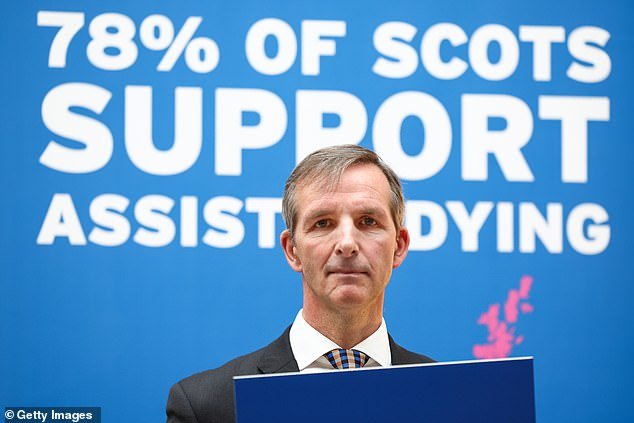British Dignitas membership rises by 24% as Scotland could become the first UK country to legalize assisted death
- 1,900 registered UK members in 2023, an increase of 372 on the previous year
- Britain is second only to Germany in the number of registered nationals
Dignitas membership in Britain rose by 24 percent last year – as assisted dying legislation moved closer in Scotland yesterday.
In 2023 there were 1,900 registered UK members, an increase of 372 on the previous year, according to figures.
Also last year, there were 40 British residents who traveled to the clinic in Switzerland to die, Dignitas revealed.
Britain is second only to Germany in both the number of registered nationals and the total number of people who have made the journey.
A total of 1,454 people had traveled from Germany, while 571 were from Britain and 549 from France.
Britain is second only to Germany in both the number of registered nationals and the total number of people who have made the journey to the Dignitas assisted suicide clinic (pictured)
The figures cover the period 1998 to 2023. Fewer people from Germany have chosen to die at Dignitas, however, and have fallen into the single digits in recent years.
But the number of travelers from Britain has risen, as has that from France, where 50 citizens made the journey for an assisted death last year. It comes as legislation was published in Holyrood which appears to start the process of Scotland becoming the first country in Britain to legalize assisted dying.
Liberal Democrat MSP Liam McArthur introduced the bill which is likely to be voted on by MSPs later this year – it came after a consultation showed 76 per cent of Scots supported the proposals.
A vote would mark the third time the issue of assisted dying has come before the Scottish Parliament – two previous attempts to change the law have been convincingly defeated.
The bill sets out the conditions under which assisted dying would be legalized in an effort to provide “robust safeguards.”
Under the legislation, only people over the age of 16 with an advanced terminal illness would have the option of assisted death.
They would have to have the mental capacity to make the request and the bill provides for a mandatory ‘reflection period’ of fourteen days. The patient would also have to carry out the life-ending treatment himself.
Those eligible must also have lived in Scotland for at least 12 months and be registered with a medical practice.
Mr McArthur said: ‘Currently assisted dying is illegal in Scotland, a situation which I believe is leaving too many terminally ill Scots behind at the end of life.
‘It leaves them confronted with traumatic deaths that affect not only them, but those they leave behind. We can and must do better.
“The facilities… would be robustly safeguarded to ensure the process works as intended.”

Liberal Democrat MSP Liam McArthur introduced the bill which is likely to be voted on by MSPs later this year – it came after a consultation showed 76 per cent of Scots supported the proposals.
The bill has been praised by campaigners, led by Dame Esther Rantzen, who is herself a member of Dignitas and has been diagnosed with stage four lung cancer.
“The current law is cruel, complicated and causes terrible suffering to vulnerable people,” she said.
‘I have received dozens of letters from people describing the painful deaths of those they loved. This is literally a matter of life and death.”
But Bishop of Paisley John Keenan said the bill ‘attacks human dignity’ and introduces a dangerous idea that a citizen can lose their value and worth.
“Assisted suicide sends the message that there are situations where suicide is an appropriate response to a person’s individual circumstances, concerns and fears,” he said.
